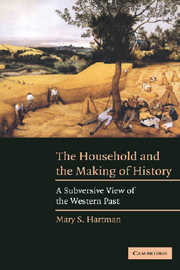Book contents
- Frontmatter
- Contents
- Preface and Acknowledgments
- 1 How Northwestern Europe Was Strange
- 2 Marrying Early and Marrying Late
- 3 The Riddle of the Western Family Pattern
- 4 The Women and Men of Montaillou and Salem Village
- 5 Communities in Crisis
- 6 What Men and Women Want
- 7 Interpreting the Western Past with the Women and the Households Left In, 1500–1800
- 8 The Late-Marriage Household, the Sexes, and the Modern World
- Epilogue
- Index
3 - The Riddle of the Western Family Pattern
Published online by Cambridge University Press: 05 June 2012
- Frontmatter
- Contents
- Preface and Acknowledgments
- 1 How Northwestern Europe Was Strange
- 2 Marrying Early and Marrying Late
- 3 The Riddle of the Western Family Pattern
- 4 The Women and Men of Montaillou and Salem Village
- 5 Communities in Crisis
- 6 What Men and Women Want
- 7 Interpreting the Western Past with the Women and the Households Left In, 1500–1800
- 8 The Late-Marriage Household, the Sexes, and the Modern World
- Epilogue
- Index
Summary
Medievalist Judith Bennett has an eye for the awkward but telling bit of evidence. She called attention a while ago to late-fourteenth- and fifteenth-century English manorial court records that cite single peasant women as purchasers of marriage licenses. This seemingly inconsequential item had disruptive potential, as she well knew, since many scholars have long held that peasant households are governed by collective rather than individual economic activity. In such settings, the idea that a lone woman might earn and spend her own money, let alone select her own husband, is unthinkable.
The marriage licenses in question, called merchets, were fees paid by unfree peasants to the lord of a manor upon a woman's marriage. While historians had already remarked individual women among the purchasers, most persisted in treating merchets as taxes paid by households. Accustomed to portraying medieval households in northwestern Europe like those in most other agricultural societies – that is, as self-contained units of production, consumption, property-holding, and mutual support – they simply brushed anomalous evidence of this sort under their all-purpose interpretive rug.
In a clever analysis of over 400 merchet payments, Bennett, however, argues convincingly that the women recorded as purchasers in a third of the cases actually did buy the licenses with their own earnings. (Fathers of brides are recorded as buying a third, bridegrooms-to-be a quarter, and others, such as a bride's mother, 8 percent.)
- Type
- Chapter
- Information
- The Household and the Making of HistoryA Subversive View of the Western Past, pp. 70 - 110Publisher: Cambridge University PressPrint publication year: 2004



